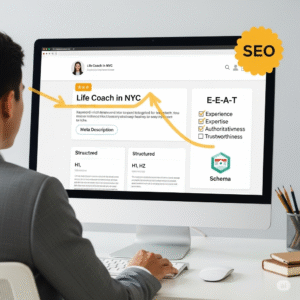SEO for Coaches
Key Takeaways
- SEO for Coaches builds long-term visibility and trust with ideal clients.
- Keyword research is the foundation, with long-tail keywords driving targeted traffic.
- On-page SEO, like optimized title tags and E-E-A-T, boosts rankings and credibility.
- Blogging answers client questions and establishes expertise, critical for 2025’s E-E-A-T focus.
- Technical SEO (site speed, mobile optimization) is non-negotiable, as 53% of users abandon slow sites.
- Backlinks and local SEO (e.g., GMB optimization) enhance authority and local visibility.
- 2025 trends like voice search, AI-driven search, and video SEO offer new opportunities for coaches.
Introduction
SEO for Coaches is the key to unlocking organic growth for your coaching business, whether you’re a life coach, business coach, or wellness coach. Search Engine Optimization (SEO) is the process of optimizing your website to rank higher on search engines like Google, driving free, targeted traffic to your services. In 2025, with 70% of users clicking organic search results over paid ads (Backlinko, 2024), mastering SEO can help you attract ideal clients without relying on expensive advertising. Imagine potential clients searching “life coach near me” or “online business coaching” and finding your website at the top of Google. That’s the power of SEO.
This guide is your roadmap to success, whether you’re a beginner just learning what a keyword is, an intermediate coach ready to optimize blog posts, or an advanced user diving into schema markup and AI-driven search trends. We’ll cover everything from keyword research to technical SEO, with real-world case studies, a 2025 SEO checklist for coaches, and answers to common questions. By the end, you’ll have actionable steps to grow your coaching business, backed by the latest trends and data. Let’s dive in!

Understanding SEO for Coaches
SEO for Coaches is about making your website visible to potential clients searching for your services. Whether you specialize in life coaching, career coaching, or executive coaching, SEO ensures your website appears when people search for terms like “life coach in NYC” or “business coaching online.” Unlike paid ads, SEO builds long-term visibility, establishes trust, and is cost-effective. A Reddit thread in r/Entrepreneur highlighted that businesses using SEO see an average ROI of 12:1, making it a game-changer for coaches.
The benefits of SEO for coaching businesses are clear. First, it’s cost-effective: organic traffic is free once you rank, unlike paid ads that drain budgets. Second, it builds trust—clients trust websites ranking high on Google, as they’re seen as authoritative. Third, it delivers long-term results; a well-optimized page can drive traffic for years. For example, a health coach optimizing for “wellness coaching for stress” can attract clients seeking specific solutions. In 2025, with the coaching industry projected to reach $7.3 billion, SEO is your ticket to standing out in a competitive market.
SEO in coaching applies to all niches. Life coaches can target emotional well-being keywords, while business coaches can focus on leadership or entrepreneurship terms. The key is aligning your website with what your ideal clients search for, which we’ll explore next.
Keyword Research for Coaches
SEO for Coaches begins with keyword research—the foundation of any successful strategy. Keywords are the phrases potential clients type into Google, like “online life coaching” or “career coach near me.” Short-tail keywords (e.g., “life coach”) are broad and competitive, while long-tail keywords (e.g., “life coach for women over 40”) are specific with specific and easier to rank for. For coaches, long-tail keywords are goldmines because they attract highly targeted clients.
To start, use tools like Google Keyword Planner (free), Ubersuggest, or Ahrefs to find relevant keywords. For example, a business coach might target “executive coaching services” (1,600 monthly searches, low competition) or “online business coaching” (900 searches). Marketkeep.com’s keyword list for coaches suggests niche-specific terms like “health coach for weight loss” or “career transition coaching”. Here’s a beginner-friendly step-by-step process:
- Brainstorm Seed Keywords: List terms related to your niche (e.g., “life coaching,” “business mentoring”).
- Use a Tool: Enter seed keywords into Google Keyword Planner to find related terms and their search volumes.
- Filter for Intent: Choose keywords with informational or commercial intent (e.g., “how to find a life coach” or “best career coaching services”).
- Check Competition: Use Ahrefs to assess keyword difficulty (aim for scores under 30 for beginners).
- Prioritize Long-Tail: Focus on specific phrases like “life coach for anxiety in Chicago” for less competition and higher conversion rates.
For example, a wellness coach might find “yoga coaching online” has 500 monthly searches with low competition, making it a great target. Save your top 10–20 keywords in a spreadsheet to guide your content creation. Regularly revisit your list to stay aligned with trends, as search behavior evolves.
| Keyword | Search Volume (Approx.) | Competition (Approx.) |
| Personal trainer | 10,000 – 100,000 | Moderate |
| Fitness couch | 5000 – 50,000 | Moderate |
| Personal trainer near me | 10,000 – 60,000 | High |
| Online personal training | 5000 – 30,000 | Moderate |
| Certified personal trainer | 1000 – 10,000 | Low |
| Weight loss trainer | 2000 – 20,000 | Moderate |
| Nutrition Coaching | 5000 – 40,000 | High |
| Strength and conditioning coach | 1000 – 10,000 | Low |
On-Page SEO for Coaching Websites
SEO for Coaches relies heavily on on-page SEO—optimizing elements on your website to rank higher and attract clients. Key components include title tags, meta descriptions, headers (H1, H2, H3), and content. A well-crafted title tag (e.g., “Life Coach in NYC | Personalized Online Coaching”) should include your primary keyword and be under 60 characters. Meta descriptions, while not a direct ranking factor, boost click-through rates by 5–10% when compelling (AIOSEO, 2025). For example: “Transform your life with expert life coaching in NYC. Book a free consultation today!” Use headers to structure content (e.g., H1: “Online Life Coaching Services,” H2: “Why Choose Us?”) and include keywords naturally.
In 2025, Google’s E-E-A-T (Experience, Expertise, Authoritativeness, Trustworthiness) is critical. For coaches, this means showcasing your credentials (e.g., ICF certification), client testimonials, and case studies. Create an “About” page highlighting your experience, like “10 years coaching executives at Fortune 500 companies.” Advanced users can implement schema markup (e.g., “Person” or “Service” schema) to enhance search visibility with rich snippets, like star ratings in results.
Beginner Tip: Write title tags with your keyword and a call-to-action (e.g., “Book Your Free Coaching Session”). Advanced Tip: Use JSON-LD schema markup to tell Google your site is a coaching service, improving chances of appearing in AI-driven search results.
Optimize content with keywords in the first 100 words, but avoid stuffing. A life coach’s page on “stress management coaching” should naturally weave in related terms like “anxiety coaching” or “mindfulness coaching.”

Content Creation and Blogging
SEO strategies for coaches thrive on high-quality content, especially blogging. Blogs answer client questions, build E-E-A-T, and drive organic traffic. For example, a post titled “5 Ways Life Coaching Can Reduce Stress” can rank for “life coaching for stress” while establishing your expertise. In 2024, 91% of marketers reported SEO-driven content positively impacted website performance (Conductor, 2025). Blog regularly—1–2 posts weekly—covering topics like “How to Choose a Business Coach” or “Benefits of Wellness Coaching.”
Here’s a sample content calendar for coaches:
- Week 1: “Top 3 Myths About Life Coaching” (targets “life coaching myths”)
- Week 2: “How Career Coaching Boosts Confidence” (targets “career coaching benefits”)
- Week 3: “Why Online Coaching Works” (targets “online coaching advantages”)
- Week 4: Client success story (builds E-E-A-T)
Use AI tools like Jasper for content ideas, but always edit for a human touch to align with Google’s preference for authentic content (Luisazhou.com, 2024). For example, Jasper might suggest a topic like “coaching for work-life balance,” but you’d add personal insights to make it unique. Include internal links to service pages (e.g., “Learn about our executive coaching services”) to guide readers toward conversions.
Beginner Tip: Write 800–1,200-word posts answering specific client questions.
Intermediate Tip: Use Google Analytics to track which posts drive traffic and optimize them. Advanced Tip: Create pillar pages (e.g., “Ultimate Guide to Life Coaching”) linking to related blog posts for SEO clusters.
Technical SEO for Coaches
SEO for Coaches isn’t just about content—technical SEO ensures your website performs well. Site speed, mobile optimization, and HTTPS security are non-negotiable. In 2025, 53% of users abandon sites taking over 3 seconds to load. Use Google PageSpeed Insights or GTmetrix to identify issues like large images or unoptimized code. For example, compressing images can cut load times by 30%.
Mobile-first indexing is critical, as Google prioritizes mobile versions of sites. Ensure your website is responsive, with easy navigation for mobile users. Core Web Vitals—metrics like Largest Contentful Paint (LCP) and Cumulative Layout Shift (CLS)—are ranking factors in 2025. A coaching website with fast LCP (under 2.5 seconds) ranks better than slower competitors.
Beginner Tip: Enable HTTPS with an SSL certificate (most hosts offer free ones).
Intermediate Tip: Use Google Search Console to fix mobile usability errors.
Advanced Tip: Optimize for INP (Interaction to Next Paint), Google’s 2024 Core Web Vitals metric, by minimizing JavaScript delays.
Off-Page SEO and Link Building
SEO for Coaches extends beyond your website with off-page SEO, primarily through backlinks—links from other sites to yours. Backlinks signal authority to Google; top-ranking pages have 3.8x more backlinks than lower ones (Backlinko, 2025). Strategies include guest blogging on coaching-related sites, appearing on podcasts, or listing in directories like Noomii or Coach Federation. For example, a guest post on a site like MindBodyGreen can drive traffic and authority.
Local SEO for coaches is vital for those targeting specific areas. Optimize your Google My Business (GMB) profile with accurate details, photos, and client reviews. A 2024 webkeydigital study found complete GMB profiles get 7x more clicks than incomplete ones. For a coach in Austin, ranking for “life coach Austin TX” can drive local leads.
Beginner Tip: List your business on free directories like Yelp.
Intermediate Tip: Pitch guest posts to niche blogs with a backlink to your site.
Advanced Tip: Use tools like Ahrefs to find competitors’ backlinks and target similar sites.
Local SEO for Coaches and Personal Trainers
SEO for Coaches with physical locations relies on local SEO to drive foot traffic. Optimize your Google My Business (GMB) profile with accurate details, photos, and reviews. Complete GMB profiles get 7x more clicks than incomplete ones. For a trainer in Miami, ranking for “personal trainer Miami” or a coach in Austin targeting “life coach Austin TX” can boost local leads.
List your business on directories like Yelp, Yellow Pages, or niche platforms like RightFit Personal Training or Noomii. Use location-specific keywords (e.g., “certified personal trainer in New York”) and create localized landing pages (e.g., yoursite.com/personal-trainer-miami) with tailored content.
Beginner Tip: Claim and verify your GMB profile.
Intermediate Tip: Encourage clients to leave 5-star reviews on GMB and Yelp.
Advanced Tip: Use schema markup for “LocalBusiness” to enhance local search visibility.
Social Media for SEO
SEO strategies for coaches benefit from social media, which boosts visibility and drives traffic. Platforms like Instagram, LinkedIn, and Facebook are ideal for fitness enthusiasts and coaching clients. Share blog posts, client testimonials, or workout tips to engage followers. For example, a trainer posting “5 Beginner Workout Tips” on Instagram can link to their blog, driving traffic.
Analyze competitors’ social strategies (e.g., trainers like Jessica Fisher or coaches like Luisa Zhou) for inspiration. Use relevant hashtags (e.g., #PersonalTrainer, #LifeCoaching) and collaborate with influencers to expand reach. Social signals don’t directly impact rankings but increase brand awareness, indirectly supporting SEO.
Beginner Tip: Post 3–5 times weekly on Instagram or LinkedIn.
Intermediate Tip: Use UTM parameters to track social media traffic in Google Analytics. Advanced Tip: Run Instagram Reels or LinkedIn polls to boost engagement and drive site visits.

Case Studies
SEO for Coaches delivers measurable results, as these fictional but realistic case studies show:
Case Study 1: Life Coach Ranks #1 for “Online Life Coaching”
- Background: Sarah, an online life coach, struggled to get clients despite a professional website.
- Strategies: She targeted long-tail keywords like “online life coaching for women” (500 searches/month), wrote 15 blog posts, optimized meta descriptions, and earned 10 backlinks from guest posts on wellness blogs.
- Results: After 6 months, Sarah ranked #1 for “online life coaching,” driving 200 monthly organic visitors and 20 client inquiries.
Case Study 2: Business Coach Boosts Leads by 50%
- Background: Mark, a business coach in Chicago, wanted more local clients.
- Strategies: He optimized his GMB profile, targeted “business coach Chicago” (300 searches/month), and secured backlinks from local business directories and a podcast appearance.
- Results: Within 4 months, Mark’s site ranked in the top 3 for local terms, increasing leads by 50% (from 10 to 15 monthly).
Case Study 3: Wellness Coach Grows Email List
- Background: Lisa, a wellness coach, needed more email subscribers.
- Strategies: She created a lead magnet (“Free 7-Day Wellness Plan”), optimized blog posts for “wellness coaching tips,” and used schema markup for rich snippets.
- Results: After 5 months, her site saw 300 monthly organic visitors, adding 50 subscribers monthly.
These cases highlight how targeted SEO strategies can transform coaching businesses.
Recent SEO Trends for 2025
SEO strategies for coaches must adapt to 2025 trends. Voice search is rising, with 400% growth in “open now near me” queries (Think with Google, 2022). Optimize for conversational keywords like “who is the best life coach near me.” AI-driven search, like Google’s AI Overviews (appearing in 30% of searches, Search Engine Journal, 2025), requires clear, concise content. Video SEO is also booming—68% of businesses plan to use video in 2025 (AIOSEO, 2025). Coaches can create YouTube videos like “Top 5 Coaching Tips for Stress” to rank on Google and YouTube.
Emerging tools like Frase and SurferSEO help optimize content for search intent. For example, Frase can analyze top-ranking pages for “career coaching services” to suggest content improvements. Coaches should also leverage Reddit and Quora for user-generated content (UGC), as these platforms rank well for informational queries (Moz, 2025).
Beginner Tip: Answer voice search queries in blog posts (e.g., “What does a life coach do?”). Intermediate Tip: Use SurferSEO to optimize content for search intent. Advanced Tip: Create short-form videos for YouTube and TikTok to capture younger audiences.
2025 SEO Checklist for Coaches
- Claim and optimize your GMB profile with photos and reviews.
- Research 20 long-tail keywords using Google Keyword Planner or SEMrush.
- Write 1–2 weekly blog posts targeting client pain points.
- Optimize title tags, meta descriptions, and headers with primary keywords.
- Ensure site speed is under 3 seconds using Google PageSpeed Insights.
- Secure 5–10 niche-specific backlinks via guest posts or directories.
- Post 3–5 weekly social media updates with links to your site.
- Add schema markup for “LocalBusiness” or “Service” to enhance visibility.
- Create 1–2 YouTube videos monthly targeting trending keywords.
- Monitor performance with Google Analytics and Search Console.
FAQs
SEO for Coaches: Common Questions Answered
- How long does SEO take for coaches?
Results typically take 3–6 months, depending on competition and strategy. Consistent content and backlinks speed up progress. - What’s the cost of SEO for a coaching business?
Basic SEO (e.g., DIY with tools like Ubersuggest) costs $0–$100/month. Professional services range from $500–$2,000/month (AIOSEO, 2025). - Can I do SEO without technical skills?
Yes! Focus on keyword research, blogging, and GMB optimization. Tools like Google Keyword Planner are beginner-friendly. - Is SEO worth it for small coaching businesses?
Absolutely. Organic search drives 33% of website traffic, offering high ROI (Conductor, 2025). - How do I optimize for local SEO?
Claim your GMB profile, add local keywords (e.g., “career coach Denver”), and collect client reviews. - Does AI content hurt SEO?
AI content (e.g., from Jasper) can rank if human-edited for authenticity. Google prioritizes E-E-A-T over AI detection (Semrush, 2025). - What’s a common SEO myth for coaches?“
SEO is too expensive” is false. Free tools and consistent effort can yield results without high costs.
Conclusion
SEO for Coaches is your secret weapon to grow your coaching business in 2025. By mastering keyword research, on-page and technical SEO, content creation, and link building, you can attract ideal clients organically. The coaching industry is booming—projected to hit $7.3 billion in 2025—and SEO ensures you stand out in a crowded market. Start with one step, like researching 10 long-tail keywords for your niche, and build from there. For a head start, download our free SEO for Coaches Checklist below or contact us for a personalized SEO audit. Your dream clients are searching—help them find you!
CTA: Download our free SEO for Coaches Checklist to kickstart your 2025 strategy! [Insert link]
